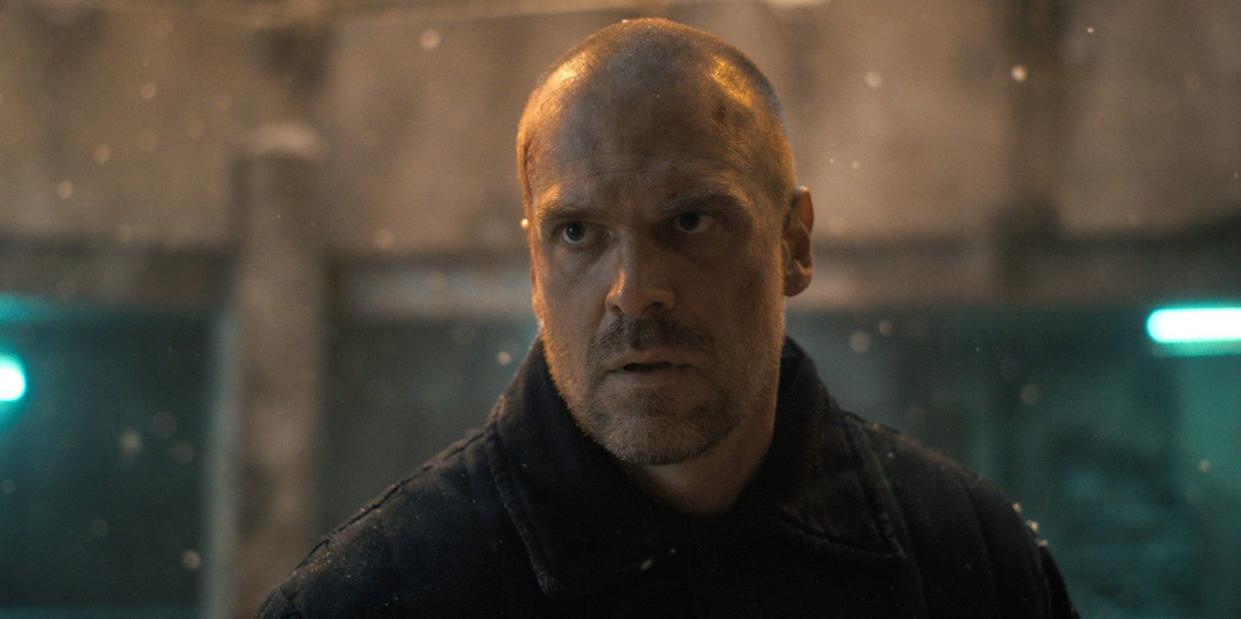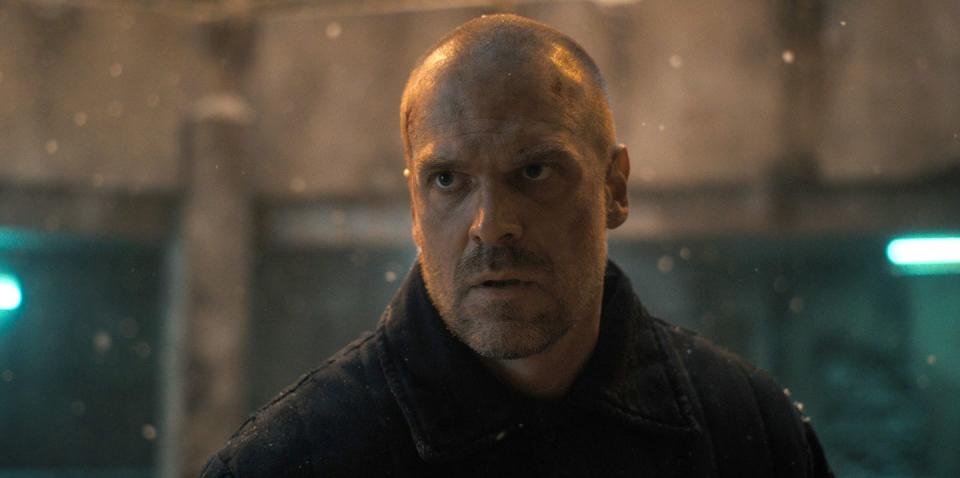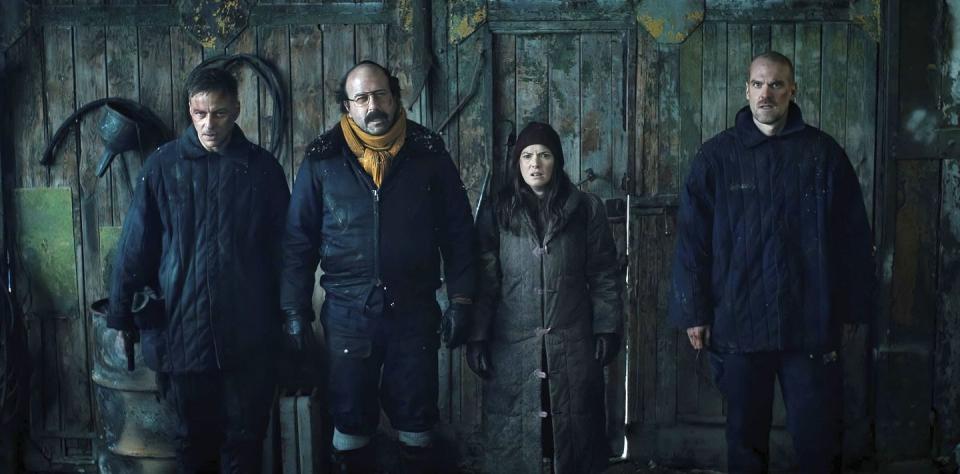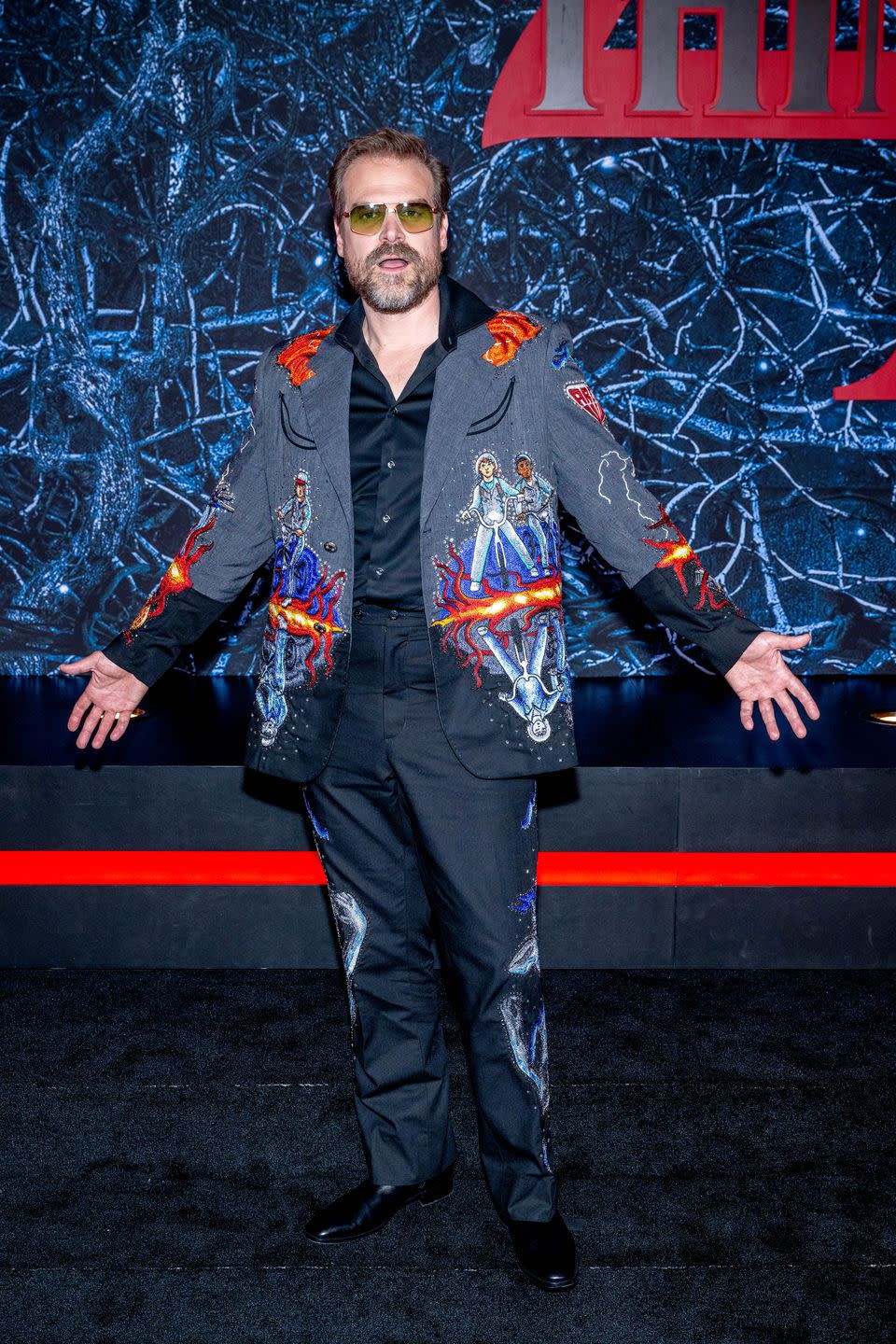Hopper's Weight Loss Shouldn't Be a Punchline on 'Stranger Things'

- Oops!Something went wrong.Please try again later.
Stranger Things season 4 spoilers follow.
We’re all still reeling from the climatic finale of season four, emotionally ravaged by the sacrifices made, and by the less than tactful way they were handled (Eddie fans, you know what we’re talking about). It was a season to remember, but for some, there’s a bitter taste left behind that lingers far beyond the pain of predictable deaths.
Stranger Things is no stranger to fatphobia – from the beginning, body diversity has been distinctly lacking in the town of Hawkins. Those who varied from the standard fit were swiftly removed (we’re thinking of you, Barb), or they became a butt of every weight joke that could be not-so-subtly dropped in.
Throughout, Hopper has been the main focus of these jokes, his weight treated as light comic relief amidst the horrors of the Upside Down. But season four took that so-called teasing to new heights, with his sudden weight loss almost celebrated by his loved ones.

Comments about him having shrunk are commonplace, even from himself, which only serves to highlight the discomfort Hopper has at being the "fat one". Those around him seemingly choose to forget he’s been in his own hellscape of a prison camp for the better part of a year.
This isn’t a man who decided to lose weight, he’s been beaten, tortured and starved into submission. Yet, all that anyone except for Joyce talks about is that Hopper isn’t fat anymore.
It’s not just the characters in the show. Fans have been quick to praise actor David Harbour’s transformation as well, with one post joking that "prison may be a good way for people to lose those stubborn pounds", while adding that Harbour is a good-looking man who "made the most of his looks" this season.
Harbour has addressed the comments about his weight loss in a recent interview with British GQ. During the course of the conversation, he explains how a regime of intermittent fasting and pilates helped him lose 80 pounds in just eight months.
"I was about 270, and when we shot [season four] I was around 190," he said, adding, "I don’t think I’ll ever do that again."
Having weight, particularly weight loss, define a character’s development arc is such a troubling message to put out there, one that can’t be excused by the get-out-of-jail-free card that "the '80s were just like that". Authenticity doesn’t, and shouldn’t, factor into fat-shaming, no matter how hard some try.

Related: Stranger Things bosses react to Millie Bobby Brown's criticism of show
Sadly though, the emphasis on Hopper’s weight isn’t the first red flag in the history of the show’s aversion to plus-size characters. Truth be told, it’s one of dozens. Stranger Things may be many things, but body positive isn’t one of them.
Across all four seasons, you can count the number of plus-size characters on one hand. Don’t think that’s alarming? Let’s take into account that this show, especially in season four, takes place across several big locations, two of which are schools, and yet still, we only see approximately one fat character. Who, guess what, is relegated to nerd/loser status.
A minor fat character isn’t diverse by any stretch of the imagination, even more so when they’re the stereotypical outcast; apparently, fat kids can’t be cool or popular.
But let’s delve even deeper, focusing on the women and AFAB characters of the show – there’s somehow even less body diversity there. The one time we did see a plus-size woman, she was treated as just a friend of Nancy’s, immaterial in the grand scheme of things. The second time there’s a plus-size character, it’s an older woman who ends up a meal for the Mind Flayer. Bob Newby? Eaten by a demodog.
A pattern of fatness equals death is emerging, whether we like to admit it or not.
The way in which fatness is shunned by the industry has been called out by Stranger Things actor Shannon Purser, who drew attention to fat actors having no "upward mobility" within the profession.

How can Stranger Things be set in such a fantastical universe, filled with all sorts of creatures, and not have the scope to include any fat main characters? Hawkins, California, Nevada, all these locations filled with new faces milling about, often in a sprawling public space, and nearly everyone is mid-size or smaller. Emphasis on smaller. It makes no sense; in the law of odds, statistically that doesn’t add up.
Now, nobody is saying the existing cast should get fatter, nor is this about shaming smaller sizes. This is about truly reflecting the wide array of body types that exist and are seen on a daily basis. Wanting to see more body diversity is no different than wanting to see more LGBTQ+ characters – we’ve been so deprived of them for decades, it’s about time they were treated as part of the main storyline instead of as extras.
Need we mention the way they keep avoiding Will Byers' sexuality, choosing to paint him as yet another tragic closeted queer struggling to accept himself?
Without plus-size characters on our screens, particularly in hugely successful shows like Stranger Things, it only serves to further reinforce the troubling relationship society has with body image. Even if it’s not intentional, it conditions us to believe that only thin, conventionally attractive bodies should be seen.
Not only is that a dangerous message, it’s also incredibly boring. And if there’s one thing that Hawkins isn’t, it’s boring.
You Might Also Like

